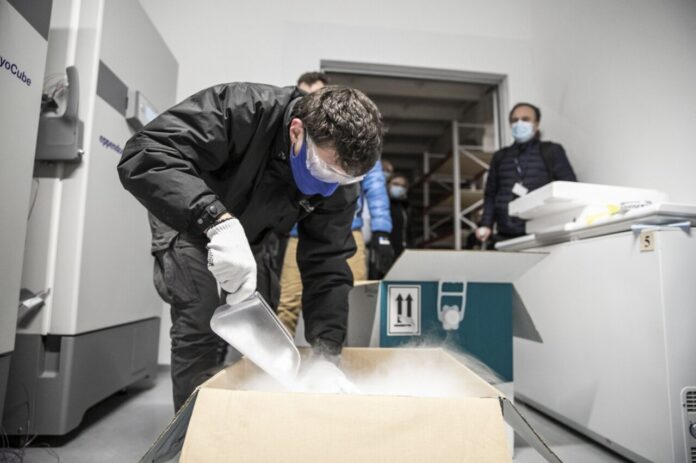
Closer to Stabilization
According to Lithuania’s chief epidemiologist Loreta Ašoklienė, although the numbers of COVID-19 infections and deaths continue growing, results show signs of stabilizing. The situation in hospitals remains difficult. The highest number of coronavirus cases is being reported in Alytus, a town in southern Lithuania.
The average daily number of new coronavirus cases in Lithuania now stands at about 2,200, based on a seven-day average. The rate stood at around 3,000 before Christmas.
January 4 Statistics
On Monday, January 4, Lithuania recorded 1,361 new cases of Covid-19 and 25 deaths from the coronavirus over the past 24 hours. However, lower testing volumes on weekends usually contribute to a lower number of cases recorded at the beginning of the week.
A total of 147,997 people have tested positive for the coronavirus in Lithuania so far. The country currently has 77,832 active cases, and 67,648 people have recovered. The coronavirus death toll has now reached 1,950. Statistics Lithuania said the number of deaths is now under review after the National Public Health Centre reported discrepancies in the previous data. A total of 1,657,248 tests for Covid-19 have been carried out in Lithuania so far, including 4,950 over the past 24 hours.
Third Vaccine Delivery
Lithuania’s Health Ministry announced that it had received its third batch of the BioNTech/Pfizer coronavirus vaccine on January 4. The country will also receive weekly deliveries of the vaccine for the next three months. The batch of 20,478 doses was flown from Germany to Lithuania at 9 AM and then transported to the Health Emergency Situations Centre’s warehouses for ultra-cold storage in special freezers.
The ministry said it plans to vaccinate all hospital personnel, ambulance crews and patients at the highest risk.The next phase of the vaccination programme will involve the medical personnel at drive-in coronavirus testing stations and fever clinics, and the staff and residents of nursing homes.
Census Begins
Lithuania is starting its population and housing census, done once in a decade. This year, census workers will gather the data from existing registries and will not be visiting people in their homes. The decision to use data from state registries and information systems is not due to the coronavirus pandemic, according to Lithuania’s statistics office. The plan to facilitate the process has been in progressing since 2011. According to Statistics Lithuania spokesperson Vanda Vaitekūnienė, most advanced countries find that their state registers reflect the real situation in the country and censuses are carried out on the basis of administrative sources. It allows the collection of high-quality data and current information. Long processing of data received from residents directly no longer meets consumers’ needs. The new method also allows saving state funds. January 1, 2021, will be the reference point for the census data, meaning that a comprehensive picture of the country’s population and households will be recorded on this day, based on demographic and socioeconomic characteristics, territorial distribution, households and families, housing, etc. The 2021 Census will be carried out using 19 state registries and information systems. Preliminary census results are expected at the end of this year.
Agreement on EU-UK Partnership
On December 24, the European Union (EU) and the United Kingdom (UK) agreed on a partnership agreement governing the future relations. Foreign Affairs Minister Gabrielius Landsbergis said that “The partnership agreement between the EU and UK provides the long-waited clarity for all those whose daily lives are connected the UK both to the business community and to all Lithuanian citizens willing to travel to the UK. Lithuania highly values that long-term close relations with the UK will continue to be fostered”.
In almost ten months of intense negotiations, the EU and the UK negotiated terms of cooperation in eleven areas: trade in goods and services, fair competition, transport, energy, fisheries, mobility and social security coordination, law enforcement cooperation, thematic cooperation, UK participation in the EU programmes and other horizontal issues, as well as governance of the agreement.
The agreement also reflects aspects important for Lithuania. Lithuania has consistently supported the aim of reaching a broad and comprehensive agreement with the UK and emphasized the importance of close cooperation in the areas of transport, movement of people and coordination of social security issues. These provisions are included in the agreement.
Lithuanian citizens who are already in the UK and have acquired one of the two resident statuses granted to EU citizens in the UK and their family members (i.e. settled or pre-settled) will not experience any changes.
The Ministry of Foreign Affairs stresses the possibility for the Lithuanian citizens who have arrived in the UK before 1 January 2021 and intend to stay in the UK to register in the EU Settlement programme for EU citizens in the UK.



























